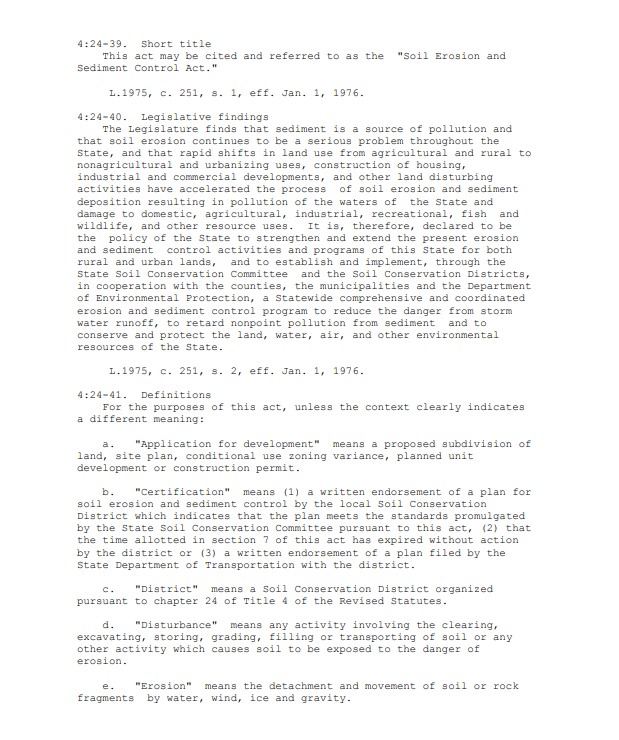Protecting New Jersey’s Natural Resources
The Soil Erosion and Sediment Control Act (Chapter 251), enacted in 1975, is a cornerstone of New Jersey’s efforts to safeguard its natural resources. This comprehensive legislation addresses the severe challenges posed by soil erosion and sedimentation, which can result from rapid urbanization and land development.
What Is the Soil Erosion and Sediment Control Act?
The act establishes a statewide program to reduce the impacts of soil erosion and sediment deposition on New Jersey’s environment and infrastructure. It focuses on managing stormwater runoff, mitigating nonpoint pollution, and conserving vital land and water resources. Through coordinated efforts by the State Soil Conservation Committee, local Soil Conservation Districts, and other government agencies, the act ensures that development activities adhere to erosion and sediment control standards.
What Does the Act Do?
The act provides clear guidelines for preventing soil erosion and sedimentation during land-disturbing activities. Key components include:
- Certification of Plans: Developers must submit and obtain approval for soil erosion and sediment control plans from their local Soil Conservation District before initiating projects.
- Standards for Control: The State Soil Conservation Committee establishes criteria, techniques, and methods for managing erosion and sedimentation based on land type, slope, and use.
- Regulatory Enforcement: Soil Conservation Districts and municipalities have the authority to enforce compliance, issue stop-construction orders, and impose penalties for violations.
Who and What Does It Affect?
The act applies to land-disturbing activities that affect more than 5,000 square feet, including:
- Residential, commercial, and industrial construction.
- Public infrastructure projects like highways and utilities.
- Mining and quarrying activities.
- Clearing and grading for non-agricultural purposes.
Exemptions exist for certain agricultural and horticultural activities. Single-family dwelling units are also exempt unless part of larger subdivisions or planned developments.
Why Is It Important?
Soil erosion and sedimentation pose significant risks to New Jersey’s environment, economy, and public safety:
- Water Pollution: Sediment is a major source of waterway pollution, carrying harmful substances like fertilizers, pesticides, and heavy metals.
- Infrastructure Damage: Sediment can clog storm drains, cause flooding, and damage roads.
- Habitat Degradation: Erosion disrupts aquatic ecosystems and wildlife habitats.
- Economic Costs: Preventing erosion is far less expensive than remediating the damage caused by sedimentation.
By implementing this act, New Jersey preserves its land, water, and air quality for current and future generations.
How Does the Conservation District Enforce the Act?
The Cape Atlantic Conservation District plays a vital role in enforcing the Soil Erosion and Sediment Control Act:
- Plan Certification: The District reviews and certifies plans to ensure they meet state standards. Applications must include detailed measures to minimize erosion and sedimentation.
- Inspections: District staff conducts on-site inspections to verify compliance with certified plans during construction.
- Stop-Construction Orders: The District has the authority to halt projects that fail to comply with certified plans.
- Penalties for Violations: Noncompliance can result in fines ranging from $25 to $3,000 per violation, with additional penalties for ongoing infractions.
- Education and Support: The District provides guidance to developers, engineers, and municipalities on best practices for erosion and sediment control.
Moving Forward
The Soil Erosion and Sediment Control Act is a powerful tool for balancing development with environmental stewardship. By enforcing this act, the Cape Atlantic Conservation District ensures that New Jersey’s rapid growth does not come at the expense of its natural resources. Together, we can build a sustainable future while protecting the land and water that sustain us.

